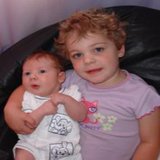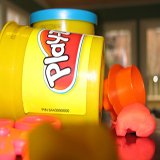Stimulating Child Language Development -
19 Month Old to 21 Month Old
As child language development continues through the 19 month old development - 21 month old development phase, your child realizes that speech is not just for the purpose of communicating her ideas and feelings - it's also a good way to make social contact.
She is increasingly interested in two-way conversation. Her broadening vocabulary and use of more complex sentence structures enable her to make more sophisticated contributions when you engage her in discussion.
Child Language Development
19 - 21 month old
Suitable suggestions for Child Language Development
(19 Month Old - 21 Month Old)
Encourage Talking
Encourage your child to talk to you about events as they occur - don't wait until the end of the day to recap as she may have forgotten about the incident.
Bear in mind that she is fascinated by everything going on around her, and has an inherent desire to speak to you about her experiences.
Whether it is putting on her vest and pants in the morning or going out for a walk in the afternoon, your talking baby is delighted to chat to you about it and needs you to respond. Use clear language, with words that she can easily understand.
If you find your child is not particularly talkative at any point in the day, don't try to force her into having a conversation with you. Maybe she is tired or perhaps she is in a bad mood.
Whatever the reason, let her have quiet times. You'll probably find that she becomes more communicative again later in the day.
Demonstrate words
You can also further enhance language development in children of both receptive language (the language she understands when it is spoken to her) and expressive language (the language she uses to voice her own ideas and feelings) by demonstrating the meanings of new words with which they are not fully familiar.
For instance, if you want to say to her 'That man is very tall', raise your hands high at the same time so that she sees a visual interpretation of your comment. Words accompanied by a physical demonstration of their content enhances her grasp of the meaning.
Listening games
Child language development can further be enhanced by making up listening games to play with her. For instance, you can ask her to shut her eyes and to listen very carefully and tell you when she hears a car go past your house - if she doesn't get it right first time, let her try again.
Or you could read her a story, substituting her name for the name of the central character, and ask her to let you know whenever she hears her name mentioned as you read.
Listening games for children that involves your child in focusing on listening closely for information will benefit her language development and provide lots of fun along the way.
Be sure to visit all the child language development pages for different ages.
Read more about the different language development stages.
Top Tips for Child Language Development
(19 Month Old - 21 Month Old)
- Ask her to name objects.
- Respond when she talks to you.
- Expect her to 'clam up' in company.
- Use doll play.
- Sing songs together.
Point to an object she knows and ask her what it is called. Gradually extend this to new objects that you haven't heard her name before - if she's not sure, tell her the word she is looking for.
Whether or not you fully understand what your 21-month-old toddler says to you, give her a positive response, such as a smile or a nod. She needs this sort of encouraging feedback from you.
Despite her instinctive desire for attention, your child may suddenly lose her confidence to speak when she in confronted by a sea of faces. She'll speak once she is alone with you again.
Give you toddler instructions for her doll. For instance, 'Put your doll over there' of 'Give your doll a drink'. This helps develop her ability to listen, to think, to interpret and then to act on what she has heard.
Her increased speech and language skills mean that she can join in more easily when you sing songs to her. If you pick her favorites, you'll find that she tries to sing along.
Top Toys for a 19 Month Old - 21 Month Old
- story books
- tapes or CD's of children's songs
- animals and farm buildings
- toy cars
- children's video tapes
Be sure to browse through all the language child development pages that is broken down in different age groups.
Read more about the different language development stages.
Find It!
Can't remember where you read something specific? Just type in your search term in the box below and your specific topic will be returned to you instantly.









